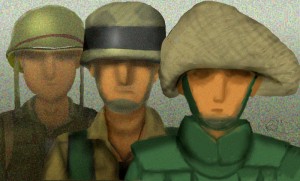Dear Niot,
The scene at your enlistment next Monday will not be as dramatic as your grandfather’s. He set off for infantry boot camp in the U.S. Army on February 19, 1944. His entire family—Ma, Pa, and sisters Jean, Bernice, and Laki—accompanied him to the train station at Cleveland’s Terminal Tower. Your great-grandmother and her daughters wailed and screamed. When the young recruit pointed out that other families, if teary-eyed, were sending their sons off with considerably more decorum, Ma retorted: “They’re not Jewish mothers!”
Nor will it be as lonely as my own enlistment. My parents, brother, and sister were on the other side of the world, and the kibbutz driver who dropped me and a few other guys off at the enlistment office in Tiberias on August 16, 1982, was hardly an adequate surrogate for family.

Your older brother insisted on going alone; farewells were bid at our apartment door. You’ve kindly agreed to allow your mother to take the number 4 bus with you to Ammunition Hill in East Jerusalem, where an army bus will be waiting. I’ll be on the other side of the world, on a trip to the U.S.
Your grandfather and I enlisted in the middle of wars. His sergeant greeted him and his fellow-trainees by shouting: “Gentlemen, in six months, half of you will be dead!” My sergeant was not so blunt. But, while Beirut was not as deadly as D-Day, I faced the prospect of being sent to a front in a foreign land.
No war rages now, but your mother and I are not much comforted by that. While it’s true for the moment, Israel faces vicious enemies on all fronts. And we know that the present semi-calm is precarious—invasions, incursions, and operations are regular occurrences and there’s a good chance that you’ll be involved in one or more during the three years of your mandatory service. Since you’ve chosen the Golani Brigade, you’re likely to be in the vanguard of whatever campaign the government decides on.
Your grandfather joined a non-Jewish army to fight against Hitler, in a war he believed in with all his heart and soul. He ate, for the first time in his life, pork chops, ham, and bacon, and guiltily enjoyed them. He didn’t bother putting on tefillin. He had to put up with anti-Semitic comrades and his sergeant’s regular Sunday morning order: “Men, you will now attend the church of your choice!”
I joined a Jewish army fighting a war about which I was skeptical at enlistment. Within a few weeks, as the facts of the decision to invade Beirut and of the Sabra and Shatila massacres hit the newspapers, I was convinced that the Begin government’s Lebanon adventure was wrong. But in the IDF the food was kosher and we religious guys were given 20 minutes each morning to put on tefillin and daven a super-fast shaharit. There were no anti-Semites, but some of the tough development-town kids who were the great majority in our platoon were pathological Ashkenazi-baiters.






